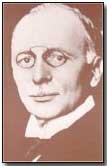Primary Documents - Yugoslav National Council's Address to Prince Alexander of Serbia, 24 November 1918
 With the Austro-Hungarian
empire rapidly crumbling in 1918 moves were well underway to instigate the
creation of a new Greater Serbia state.
With the Austro-Hungarian
empire rapidly crumbling in 1918 moves were well underway to instigate the
creation of a new Greater Serbia state.
The establishment of the Kingdom of the Serbs, Croats and Slovenes - which was formally declared on 1 December 1918 and renamed Yugoslavia in October 1929 - demonstrated the clear determination on the part of Serbs, Croats, Slovenes, Montenegrins, Bosnians, Macedonians and others to win self-determination from Austria; the collapse of the empire brought such nationalist agitation to a head.
Reproduced below is the text of the address of the Ante Trumbic-led Yugoslav National Council, dated 24 November 1918, which expressed its concern at Italian regional territorial aspirations arising from the April 1915 Treaty of London. Click here to read the Serbian government's response to the Yugoslav National Council's address.
Click here to read the text of the Corfu Declaration of 20 July 1917 which established the Allied-backed principles upon which the new state would be created and governed. Click here to read the declaration of the Montenegrin assembly - the Skupshtina - which affirmed its intention to join the new state and to depose its own monarch, King Nicholas, in favour of Serbian monarch King Peter.
Address from the Yugoslav National Council to the Regent of Serbia, 24 November 1918
Sent from the Council at Zagreb on 24 November 1918 and delivered at Belgrade to the Regent of Serbia on 1 December 1918
The National Council desires that a national representation should be established by agreement with the National Council and the popular representatives of the Kingdom of Serbia, and that the Government should be made responsible, according to modern parliamentary principles, to this representation, which would sit in permanence until the Constituent.
For the same reasons the former administrative and autonomous institutions would remain in vigour. In this period of transition it is in our opinion necessary to create the conditions for a definite organization of one unitary State.
With this end in view, the Government should prepare the Constituent, which, according to the proposal of the National Council, would be elected on the basis of secret, universal, and proportional suffrage, and convoked at latest six months after the conclusion of peace.
At this historic moment, when we appear before your Royal Highness as representatives of all the Yugoslav territories of the former Austro-Hungarian Monarchy, we are profoundly grieved to observe that large portions of our national soil are occupied by the troops of the Kingdom of Italy, which is allied with the Entente Powers, with whom we desire to live in friendly relations.
But we cannot recognize any contract, not even that of London [the Treaty of April 1915], by virtue of which, in violation of the principle of nationalities, we should be obliged to surrender part of our nation to other States.
We draw your Royal Highness's attention to the fact that the Italian occupation far exceeds the limits and regions provided even by the clauses of the armistice, which was concluded with the Commander in Chief of the former Austro-Hungarian Army long after these territories had been declared an independent and integral portion of the State of the Serbs, Croats, and Slovenes. Of this we will furnish proofs to the Government of your Royal Highness.
In full conscience we express our hope that your Royal Highness, with our whole nation, will endeavour to secure that the final frontiers of our State shall be drawn in conformity with our ethnographic frontiers and with the principles put forward by President Wilson and the other Entente Powers.
Long live his Majesty King Peter! Long live your Royal Highness! Long live the nation of Serbs, Croats, and Slovenes! Long live free and united Yugoslavia!
Source: Source Records of the Great War, Vol. VII, ed. Charles F. Horne, National Alumni 1923
Around one million Indian troops served in WW1, of which some 100,000 were either killed or wounded.
- Did you know?
